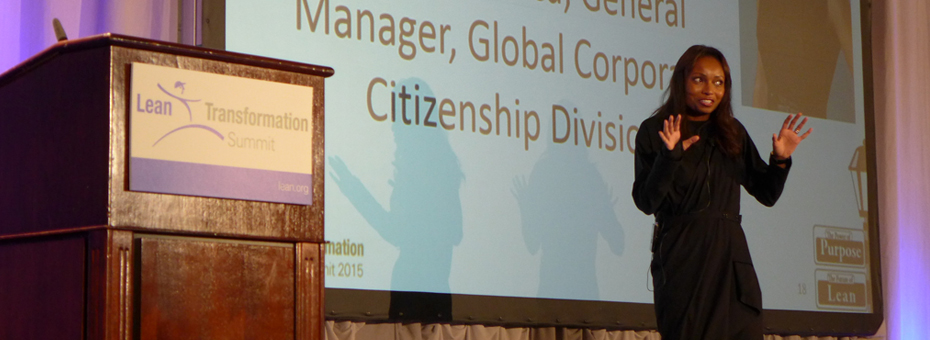Photo courtesy of semanticwill
The success of Toyota’s lean management principles in manufacturing, healthcare, product development, and other areas is well known and well documented. Now the company is applying these concepts to social innovation in order to give back to society as well as shareholders. Latondra Newton, Toyota’s Group VP and Chief Social Innovation Officer spoke on this topic at our recent Lean Transformation Summit March 5-6 in New Orleans. I caught up with her to hear more about how this effort works and why it’s important to Toyota’s continued growth.
LEI: Sharing the Toyota Production System (TPS) to strengthen supplier capabilities makes perfect business sense. But why does Toyota share the system with other manufacturers and nonprofits?
Latondra Newton: From the very founding of our company, contributing to society has been at the heart of our mission. If society thrives, we thrive. So, for more than two decades, we have shared our know-how with other manufacturers and nonprofits to help them find better ways of doing their day-to-day work.
Working together, we have helped the American Red Cross register and train volunteers more efficiently, the Food Bank For New York City feed more people faster, the St. Bernard Project rebuild houses in New Orleans better and more quickly, and the Michigan furniture maker Herman Miller operate more cost-effectively.
When our partners tell us about their challenges, we don’t pretend to know all the answers right away. What we do know is that we have to roll up our sleeves and meet them – often right on the shop floor – to see up-close how they operate, and find solutions together. Once our partners learn our approach, we encourage them to make it their own and use it every day. Sharing our ideas this way helps our partners stay competitive and preserve jobs or support more people in need – and that benefits all of us.
As the company that started all of this, what are the current challenges Toyota faces to ensure TPS and Toyota Way thinking and practice are sustained inside Toyota? How is Toyota addressing those challenges?
Maintaining a consistent, cross-company commitment to TPS is indeed an ongoing effort. Even at our company, where these values are core to our DNA, we have, at times, found it challenging to sustain our focus on TPS due to rapid growth, an evolving workforce, and changes within our industry. The focus on TPS can also be difficult to sustain in areas of the company outside of the manufacturing division.
At Toyota, we have dedicated teams and ongoing training efforts – including “boot camps” – to keep these principles alive. Sharing our know-how with nonprofit groups and other businesses is also important – not only is it a way of doing good, it also helps us by sustaining and refining TPS practices. Using TPS for the benefit of society is particularly important when it comes to engaging younger people at the company. Having a social impact is tremendously important to them.
On your Lean In profile you wrote that at every step in your career, you have “always stayed on the lookout for new problems to solve.” What problems are you working on today?
I’m working with many others at Toyota to help solve global mobility issues, today and into the future. People around the world want to move, to grow and to explore, and they want a world that is comfortable, safe and clean.
These are the principles of the Toyota Mobility Foundation, which is dedicated to advancing the freedom of mobility for everyone. We are focused on addressing disparities in mobility in emerging nations and supporting the next-generation mobility needs of the wealthier countries. There are also critical, evolving issues to confront as the population grows, as people live longer, and as cities become more crowded.
Here in North America, I’m in charge of our social innovation efforts. We know that Toyota cannot achieve sustainable growth if we are not serious about improving the world around us. As Group Vice President and Chief Social Innovation Officer, I’m responsible for bringing together – for the first time – Toyota’s North American social innovation activities, including philanthropy, community relations, diversity and inclusion, and Toyota U.S.A. Foundation activities into a single, high-performance team as part of our overall One Toyota initiative.
In addition to unifying these functions at Toyota, I am committed to reshaping our strategy for nonprofit partnerships to better reflect our company’s longstanding focus on problem-solving and to ensure we can have the greatest impact possible. We are currently in the process of realigning our philanthropy strategy in North America around the themes of physical and social mobility. Our vision is create value in society and in our company by advancing the “freedom and joy of mobility for everyone.”
You gave a plenary session at LEI’s 2015 Lean Transformation Summit, March 4-5 in New Orleans. Can you tell us what you spoke about?
The core theme I spoke about was: when good ideas are shared, great things can happen. In fact, sharing is absolutely essential to Toyota’s mission to help make the world a better place. It’s something that our President, Akio Toyoda, talks about often, and of course that’s why we’re here today.




